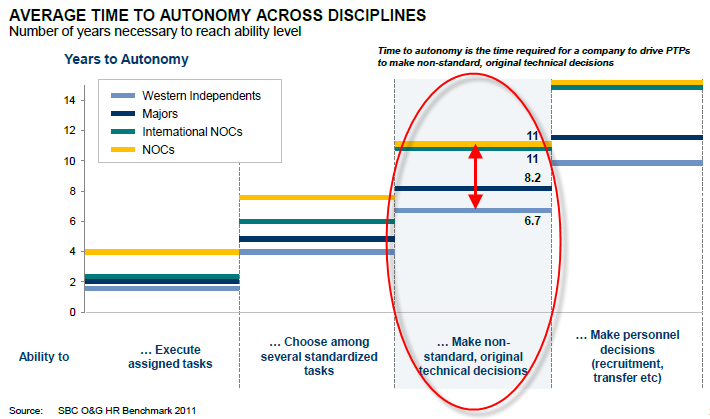Return On Knowledge (ROK) for Knowledge Networks
Soumis par Catherine Boissonnet le mar, 05/02/2013 - 12:58Schlumberger Business Consulting (SBC) compared 37 companies within the Oil and Gas sector in relation to the time that their experts and engineers spent on becoming autonomous (the autonomy delay). In other words, the time required for these experts & engineers to make nonstandard technical and original decisions.
Knowledge Management makes a difference..
The outcome was that an "innovative" organization gains between 3 to 5 years of autonomy as compared to so called "traditional" companies. SBC’s conclusion was that, one of the main reasons for this outperformance was the widespread use of Knowledge Management (KM).
Knowledge Management as practiced today is a proven technology and can truly measure a Return on Investment (ROI).
Let’s term this ROI as ROK ! Return On Knowledge.
This ROK will become more and more important as organization’s implement and rely on networks centered on structured knowledge. This leads us to the fact that networks and knowledge are inseparable. Networks are a mine field of knowledge, where knowledge is created, shared, validated and reused over and over again. In other words, knowledge breathes life into these network(s), which are the basic principles of Social KM (SKM).
What will be expected of these knowledge networks?
- Record, index and classify within various Data Bases (DB) the lessons learnt and “know-how” feedback.
- Create linkages and knowledge transfer processes between learning professionals and senior knowledge holders (an example amongst many).
The value of KM lies within the network, in other terms; the value is derived from the collective network by using individuals, activities or processes as key building blocks.
Companies must take into account the impact of Knowledge Networks on their organizations. Not only are companies the guarantor of knowledge preservation (retirements, turnover, etc.), but should also take advantage of the numerous opportunities for innovation implementation.
Derniers billets
- Le nouveau site web de VEDALIS est en ligne !
- Sans BDES, le délai de consultation du CE ne court pas.
- Peter Drucker Forum 2018 : mettre l’humain au coeur du management
- BDES ET RGPD : gestion des données personnelles
- Webinaire : L'indispensable transformation digitale des clusters et pôles de compétitivité
- Capitaliser les retours d’expérience
- Ordonnances Macron : Une souplesse apportée à la BDES
- Miser sur le capital immatériel pour favoriser l’innovation
- Les Knowledge Managers : les nouveaux métiers de l’IA
- BDES : Rappel sur les évolutions de 2018




